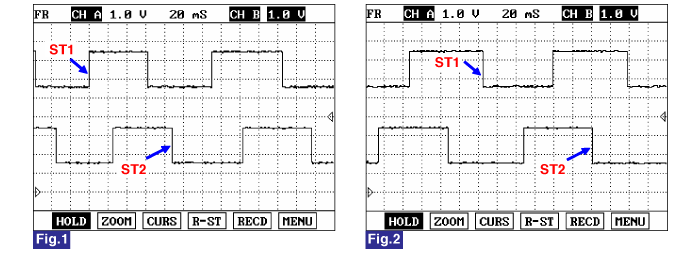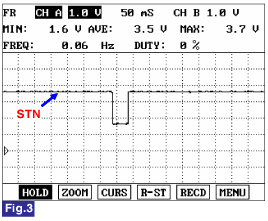Has a problem been found?
 | ▶ Repair as necessary and then go to "Verification of Vehicle Repair" procedure. |
 | ▶ Go to "Signal Circuit Inspection" procedure. |
Many malfunctions in the electrical system are caused by poor harness(es) and terminal condition. Faults can also be caused by interference from other electrical systems, and mechanical or chemical damage.
Thoroughly check connectors for looseness, poor connection, bending, corrosion, contamination, deterioration, or damage.
Has a problem been found?
 | ▶ Repair as necessary and then go to "Verification of Vehicle Repair" procedure. |
 | ▶ Go to "Signal Circuit Inspection" procedure. |
Ignition "ON" & Engine "OFF".
Turn the steering wheel to the left or right.
Measure waveform between signal terminal of the HECU harness connector and chassis ground with osciloscope.
Specification : Check the voltage range (HIGH : 2.9±0.1V ~ 4.4±0.1V LOW : 1.2±0.1V ~ 2.1±0.1V) of the sensor signal in case of turning left, turning right, center position. If normal waveforms such as fig1, 2, 3 are detected in each condition, It is normal.


Fig 1) Normal waveform of steering angle sensor with turning left after ENG "ON" : Output signal change ("LOW" → "HIGH") is detected first in ST1.
Fig 2) Normal waveform of steering angle sensor with turning right after ENG "ON" : Output signal change ("LOW" → "HIGH") is detected first in ST2.
Fig 3) Normal waveform of steering angle sensor being center position after ENG "ON" : Output signal change ("HIGH" → "LOW") is detected when steering wheel is passing by on center position.
※ "LOW" : approx 1.5V, "HIGH" : approx 3.5V.
Is the measured waveform within specifications?
 | ▶ Substitute with a known-good HECU and check for proper operation. If problem is corrected, replace HECU and then go to "Verification of Vehicle Repair" procedure. |
 | ▶ Repair open or short in signal circuit between the steering angle sensor harness connector and HECU harness connector and then, go to "Verification of vehicle Repair" procedure. If there is no problem in Signal circuit, Substitute with a known-good HECU and check for proper operation. |